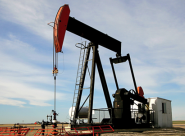Libya’s largest oil-export terminal, the port of Es Sider, may re-open in August after the North African nation’s new parliament takes office, said a spokesman of the rebel group that shut the facility almost a year ago.
“It’s possible to solve all issues and get to an agreement to re-open Es Sider and Ras Lanuf when the new parliament starts working, God willing, after Ramadan,” Ali Al-Hassy, a spokesman of the Executive Office for Barqa, said by phone from eastern Libya.
Ras Lanuf is the second of two ports still under control of the Barqa rebels. The Muslim fasting month of Ramadan started today, June 29, in Libya and will finish with the Eid El Fitr holiday at the end of July.
The rebels’ Executive Office for Barqa seeks self-rule for the region known also as Cyrenaica. It occupied oil ports in eastern Libya at the end of last July, demanding an oil-revenue sharing agreement to make up for the neglect the area experienced under Muammar Qaddafi’s 42-year rule.
Libya, with Africa’s largest oil reserves, is now producing about 300,000 bpd, or a fifth of its output before Qaddafi was overthrown in 2011. The loss of the country’s oil production has boosted the price of Brent, a benchmark for half the world’s traded crude.
Deal
Under an agreement reached on April 6, the Barqa federalists handed over control of Zueitina and Hariga, two of the four oil ports they seized a year ago. In return, they received an amnesty and the payment of salaries for defectors from Libya’s Petroleum Facilities Guard who joined the rebels.
The accord calls for a second round of talks aiming at a comprehensive deal that would allow the re-opening of the two remaining ports, Es Sider and Ras Lanuf.
The Barqa federalists last month threatened to cancel the April agreement in protest over the appointment as prime minister of Ahmed Maiteg, whom they see as allied with the nation’s Islamists. His appointment was later withdrawn, and elections were held last week for a new parliament.
Danske Bank on June 19 raised its third-quarter forecast for Brent crude to $107 a barrel, from $104, on the turmoil in Iraq and the protests at oil sites in Libya. “We expect the oil price to stay in the $108-114 a barrel range over coming months, as it will take some definitive progress in Iran and Libya for the oil price to break below this range,” it said.
Providing useful resources, articles and writings on crude oil, other petroleum products, energy and gas. By Giftelyon Multi-Sevices Int'l Ltd and services, UK, online.

 Giftelyon Multi Sevices Int'l Ltd is a leader in the of Nigerian Bonny Light Crude Oil (BLCO) sales market. As a privately held company, Giftelyon Multi-Sevices Int'l Limited is committed to and is focused on delivering reliable services to all her clients.
Giftelyon Multi Sevices Int'l Ltd is a leader in the of Nigerian Bonny Light Crude Oil (BLCO) sales market. As a privately held company, Giftelyon Multi-Sevices Int'l Limited is committed to and is focused on delivering reliable services to all her clients.  Giftelyon Multi Sevices International Ltd has an excellent track record of reliability in the supply of Bonny light crude oil, BLCO. We protect our buyers with 2% Performance Bond while we also expect protection from our customers with bank instrument from the world's top banks. We deliver on TTO, TTT, CIF and FOB basis.
Giftelyon Multi Sevices International Ltd has an excellent track record of reliability in the supply of Bonny light crude oil, BLCO. We protect our buyers with 2% Performance Bond while we also expect protection from our customers with bank instrument from the world's top banks. We deliver on TTO, TTT, CIF and FOB basis.

No comments :
Post a Comment